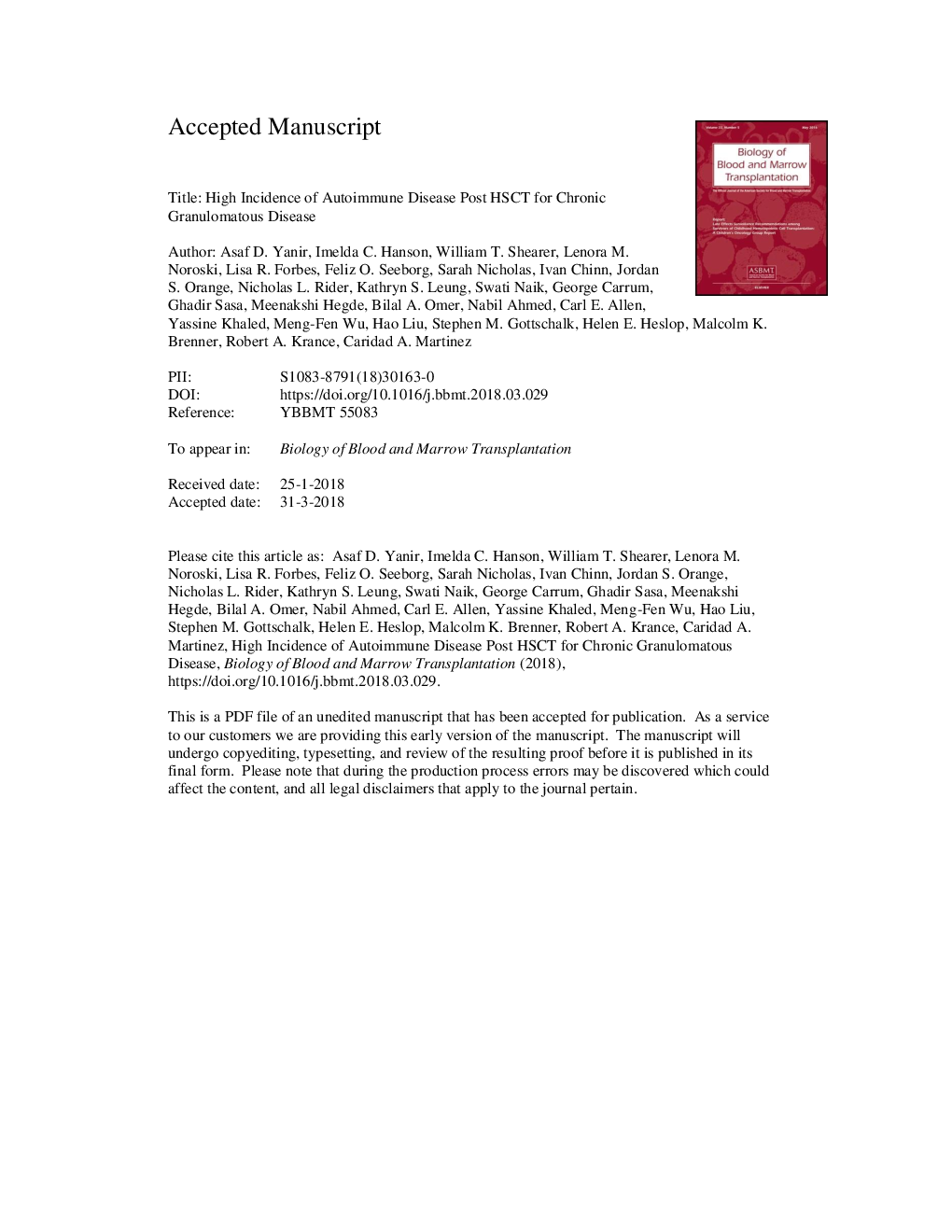| کد مقاله | کد نشریه | سال انتشار | مقاله انگلیسی | نسخه تمام متن |
|---|---|---|---|---|
| 8949652 | 1645721 | 2018 | 32 صفحه PDF | دانلود رایگان |
عنوان انگلیسی مقاله ISI
High Incidence of Autoimmune Disease after Hematopoietic Stem Cell Transplantation for Chronic Granulomatous Disease
ترجمه فارسی عنوان
شیوع بالای بیماری اتوایمیون پس از پیوند سلول های بنیادی هماتوپوئیدی برای بیماری مزمن گرانولوماتوز
دانلود مقاله + سفارش ترجمه
دانلود مقاله ISI انگلیسی
رایگان برای ایرانیان
کلمات کلیدی
موضوعات مرتبط
علوم زیستی و بیوفناوری
بیوشیمی، ژنتیک و زیست شناسی مولکولی
تحقیقات سرطان
چکیده انگلیسی
There is a lack of consensus regarding the role and method of hematopoietic stem cell transplantation (HSCT) on patients with chronic granulomatous disease (CGD). Long-term follow-up after HSCT in these patient population is essential to know its potential complications and decide who will benefit the most from HSCT. We report the outcome of HSCT and long-term follow-up in 24 patients with CGD, transplanted in our center from either related (nâ=â6) or unrelated (nâ=â18) donors, over a 12-year period (2003 to 2015), using high-dose alemtuzumab in the preparative regimen. We evaluated the incidence and timing of adverse events and potential risk factors. We described in detailed the novel finding of increased autoimmunity after HSCT in patients with CGD. At a median follow-up of 1460 days, 22 patients were full donor chimeras, and 2 patients had stable mixed chimerism. All assessable patients showed normalization of their neutrophil oxidative burst test. None of the patients developed grades II to IV acute graft-versus-host disease, and no patient had chronic graft-versus-host disease. Twelve of 24 patients developed 17 autoimmune diseases (ADs). Severe ADs (cytopenia and neuropathy) occurred exclusively in the unrelated donor setting and mainly in the first year after HSCT, whereas thyroid AD occurred in the related donor setting as well and more than 3 years after HSCT. Two patients died due to infectious complications after developing autoimmune cytopenias. One additional patient suffered severe brain injury. The remaining 21 patients have long-term Lansky scoresââ¥â80. The outcome of HSCT from unrelated donors is comparable with related donors but might carry an increased risk of developing severe AD. A lower dose of alemtuzumab may reduce this risk and should be tested in further studies.
ناشر
Database: Elsevier - ScienceDirect (ساینس دایرکت)
Journal: Biology of Blood and Marrow Transplantation - Volume 24, Issue 8, August 2018, Pages 1643-1650
Journal: Biology of Blood and Marrow Transplantation - Volume 24, Issue 8, August 2018, Pages 1643-1650
نویسندگان
Asaf D. Yanir, Imelda C. Hanson, William T. Shearer, Lenora M. Noroski, Lisa R. Forbes, Feliz O. Seeborg, Sarah Nicholas, Ivan Chinn, Jordan S. Orange, Nicholas L. Rider, Kathryn S. Leung, Swati Naik, George Carrum, Ghadir Sasa, Meenakshi Hegde,
